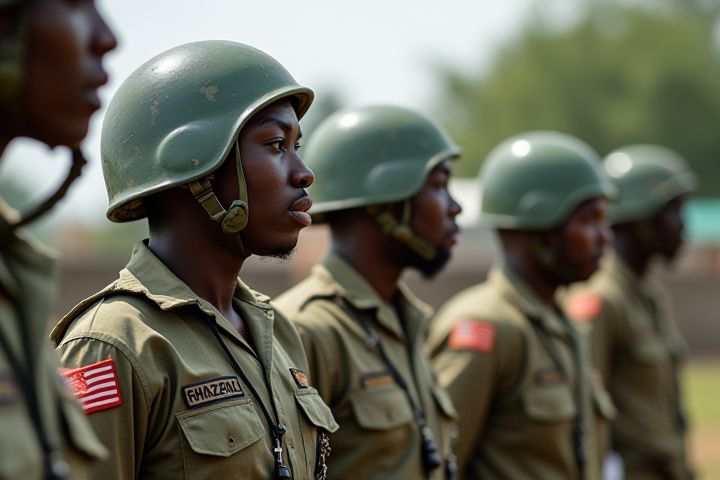
In Nigeria, peace and security remain critical challenges influenced by factors such as ethnic tensions, religious conflicts, and terrorism. The rise of Boko Haram in the Northeast has severely impacted civilian safety, leading to widespread displacement and humanitarian crises. Community engagement and grassroots initiatives are essential for fostering dialogue and conflict resolution among diverse groups. Government efforts, including military operations and international collaboration, aim to stabilize volatile regions and protect citizens. Understanding Nigeria's complex socio-political landscape is vital for developing effective strategies to enhance national security and promote long-term peace.
Boko Haram insurgency
Boko Haram, an extremist group in Nigeria, has been responsible for widespread instability, particularly in the northeastern regions. The insurgency has led to thousands of deaths, the displacement of millions, and severe humanitarian crises, impacting access to food, healthcare, and education. Security forces, along with international organizations, are actively engaged in counter-insurgency operations and community rehabilitation efforts. As you navigate the complexities of peace and security in Nigeria, understanding the local dynamics and the socio-economic factors influencing the insurgency is crucial for developing sustainable solutions.
Farmer-herder conflicts
Farmer-herder conflicts in Nigeria primarily arise from competition over land and resources, exacerbated by climate change and demographic pressures. These conflicts often lead to violence, displacing communities and undermining food security across regions like the Middle Belt. The Nigerian government, along with local stakeholders, is implementing conflict resolution strategies, such as dialogue initiatives and sustainable land management practices. Understanding the root causes of these clashes is essential for fostering peace and enhancing security in affected areas.
Militancy in the Niger Delta
Militancy in the Niger Delta region of Nigeria poses significant challenges to peace and security, as it is fueled by grievances over resource control, environmental degradation, and socio-economic neglect. Armed groups, often referred to as militants, engage in sabotage activities targeting oil infrastructure, which not only disrupts the local economy but also has broader implications for Nigeria's oil-dependent revenues. The Nigerian government's response, including military intervention and negotiation efforts, aims to address these violent conflicts while promoting sustainable development in the area. Your understanding of these dynamics contributes to recognizing how effective conflict resolution strategies can enhance stability and socio-economic prosperity in the region.
Banditry in the Northwest
In Nigeria's Northwest region, banditry has become a significant threat to peace and security, exacerbating socio-economic challenges and displacing communities. Armed groups engage in cattle rustling, kidnappings, and violent clashes with local populations, creating an atmosphere of fear and instability. Government efforts to combat banditry include military operations, community engagement, and law enforcement measures aimed at restoring order. Enhancing collaboration with local stakeholders is crucial for developing sustainable solutions to address the roots of banditry and promote long-term security in the region.
Ethnic and religious tensions
Ethnic and religious tensions in Nigeria significantly impact peace and security, stemming from historical grievances and competition for resources among diverse groups. The country's over 250 ethnicities, including major groups like the Hausa, Yoruba, and Igbo, often clash due to political marginalization, leading to violent conflicts that undermine national stability. Religious divisions, primarily between Islam and Christianity, further exacerbate these tensions, fueling inter-communal violence and terrorism from groups like Boko Haram. Addressing these complex challenges requires a multifaceted approach, promoting dialogue, inclusivity, and equitable distribution of resources to foster lasting peace.
Kidnapping for ransom
In Nigeria, kidnapping for ransom has become a pervasive threat, significantly undermining national security and public safety. Criminal groups exploit vulnerable communities, often targeting children and young adults, instilling fear and disrupting everyday life. The economic impact is profound, affecting local businesses and deterring foreign investment, while the government struggles to implement effective countermeasures. You may find that community awareness and cooperation with law enforcement are crucial in combating this alarming trend, fostering a safer environment for all citizens.
Role of Nigerian Armed Forces
The Nigerian Armed Forces play a crucial role in maintaining peace and security within the country, especially in combating insurgency and terrorism in regions like the Northeast. Through operations such as "Operation Lafiya Dole," the military actively engages in counter-terrorism efforts against groups like Boko Haram. Furthermore, the Nigerian Army emphasizes community engagement and intelligence gathering to enhance local cooperation and trust, vital elements in stabilizing conflict-prone areas. Your understanding of these efforts can highlight the complexities of national security strategies in Nigeria, reflecting the interplay between military action and community resilience.
Impact on economic development
Peace and security in Nigeria are crucial for fostering economic development, as stability attracts foreign investment and boosts local business growth. In regions experiencing conflict, economic activities decline significantly, leading to increased unemployment and poverty rates. Ensuring peace through effective governance, community engagement, and conflict resolution strategies creates a conducive environment for entrepreneurship and trade. Your understanding of these dynamics is essential for recognizing how safety directly influences Nigeria's economic prospects and overall quality of life.
Humanitarian crisis in conflict zones
Nigeria faces a significant humanitarian crisis driven by ongoing conflicts, particularly in the northeastern region, where Boko Haram insurgency has led to widespread displacement. Millions of internally displaced persons lack access to basic necessities such as food, clean water, and healthcare, compounding the vulnerability of these communities. Security challenges hinder humanitarian efforts, creating complex obstacles for aid agencies striving to provide assistance to affected populations. Ensuring peace and security is paramount to stabilizing the region and facilitating a coordinated humanitarian response to address the urgent needs of those caught in conflict.
International partnerships and aid initiatives
Peace and security in Nigeria significantly benefit from international partnerships that facilitate the implementation of crucial aid initiatives. Organizations such as the United Nations and the African Union collaborate with local agencies to address conflicts and promote stability through capacity-building programs. These initiatives often include funding for disarmament processes and community development projects aimed at reducing the root causes of violence. Your involvement or support in these programs can contribute to the broader goal of establishing a peaceful and secure environment for all Nigerians.
